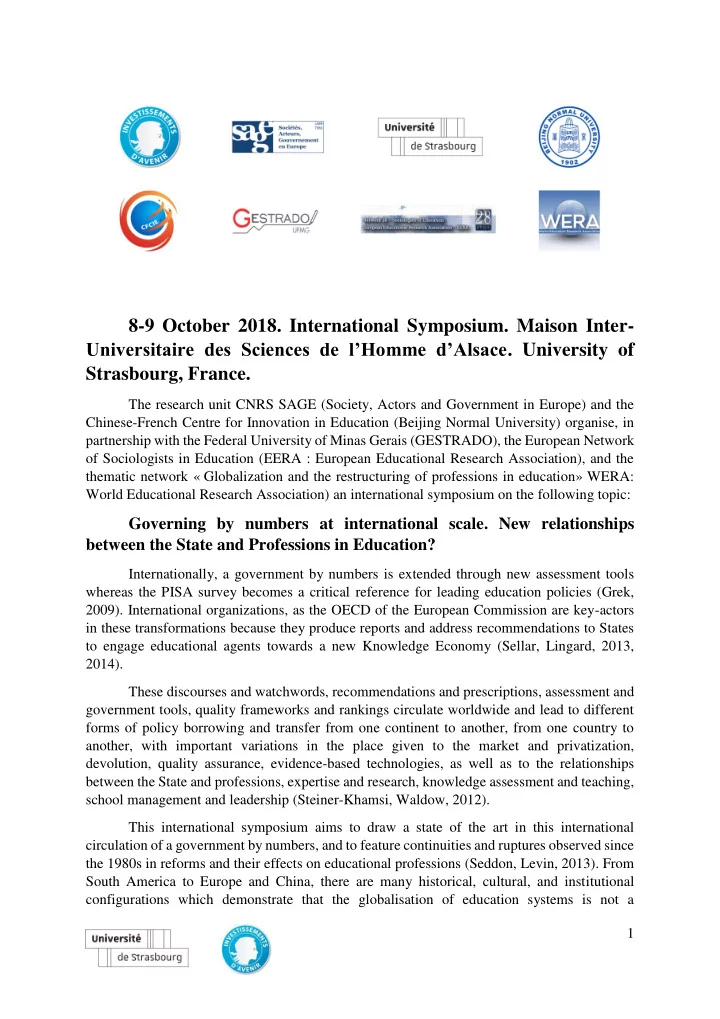

8-9 October 2018. International Symposium. Maison Inter- Universitaire des Sciences de l’Homme d’Alsace . University of Strasbourg, France. The research unit CNRS SAGE (Society, Actors and Government in Europe) and the Chinese-French Centre for Innovation in Education (Beijing Normal University) organise, in partnership with the Federal University of Minas Gerais (GESTRADO), the European Network of Sociologists in Education (EERA : European Educational Research Association), and the thematic network « Globalization and the restructuring of professions in education» WERA: World Educational Research Association) an international symposium on the following topic: Governing by numbers at international scale. New relationships between the State and Professions in Education? Internationally, a government by numbers is extended through new assessment tools whereas the PISA survey becomes a critical reference for leading education policies (Grek, 2009). International organizations, as the OECD of the European Commission are key-actors in these transformations because they produce reports and address recommendations to States to engage educational agents towards a new Knowledge Economy (Sellar, Lingard, 2013, 2014). These discourses and watchwords, recommendations and prescriptions, assessment and government tools, quality frameworks and rankings circulate worldwide and lead to different forms of policy borrowing and transfer from one continent to another, from one country to another, with important variations in the place given to the market and privatization, devolution, quality assurance, evidence-based technologies, as well as to the relationships between the State and professions, expertise and research, knowledge assessment and teaching, school management and leadership (Steiner-Khamsi, Waldow, 2012). This international symposium aims to draw a state of the art in this international circulation of a government by numbers, and to feature continuities and ruptures observed since the 1980s in reforms and their effects on educational professions (Seddon, Levin, 2013). From South America to Europe and China, there are many historical, cultural, and institutional configurations which demonstrate that the globalisation of education systems is not a 1
homogeneous process. Indeed, the international circulation takes shape through national and local contexts, specific institutional trajectories, different assimilating and disseminating processes, in reforms in which actors are involved according to different ways of mobilization or contestation (Lingard, Shaun, 2011). The first objective of the symposium is to question the way different worldwide organizations and agencies, with the development of the PISA survey, have shaped tools for evaluating education systems and discourses focused on effectiveness and quality in education. This reformist political agenda, which circulates at international scale, challenges knowledge and expertise among professionals, as well as their autonomy, in promoting new standards, recommendations, and best practices (OCDE, 2005, Seddon, Ozga, Levin, 2013, Robertson, 2012). The good students of the PISA survey, particularly Asian ones, are often take as a reference by experts to emphasize quality modernisation and improvement of education systems and to increase performance and competitiveness (Schleicher, 2012, Lindblad & Popkewitz, 2004). Some specific tools are developed (quality standards, audits, benchmarks, evidence-based data) and translated in national and local contexts. In parallel to this international agenda, education public policies are using the government by numbers to develop different assessment tools (tests, indicators, etc.). those have an important impact on the work of professions whereas some principles of local autonomy, external evaluation, diversification of school provision, performance-related pay are asserted (Ozga & Lingard, 2007, Ball, 2016, Gewirtz & alii, 2009). In analysing this international circulation, what is at stake is the recognition of the fluidity, multiplicity, and historical contingency of education policies (Popkewitz, 2000). This circulation does not correspond merely to transfer from International Organizations to national spaces but to cross-over dynamics combining processes of dissemination, selection and adaptation with interdependencies between national and local actors with diverse interests and resources (Dale, 2009). Several studies have characterized these processes in terms of “mediation”, “recontextualization”, “glocalisation”, “bricolage”, “hybridization” in showing the complexity of scales, national trajectories, transnational networks (Ball, Maroy, 2009; Dale, 1999; Ball, 1998, 2009; Maroy, 2009). So, the government by numbers is at the crossroads of multiple games of action and interaction within political spaces themselves extremely diversified. The objective of the symposium is to examine these political, cultural, institutional variations in different world regions and countries in showing how these reforms converge or diverge by their intensity, rhythm, and implementation at national or local levels. The second objective of this international symposium is to question the relationships between educational professions and the State (Hood, 1991). Indeed, the State, everywhere in the world, is relatively active in the restructuring of educational professions and their adaptation to accountability and New Public Management (Pollitt, 1990; Pollitt, Bouckaert, 2004). Educators’ professionalism is challenged by these critical changes in school organizations, conceptions of autonomy, rules of selection and recruitment, professional careers, balance between the public and the private (Evans, 2008). The government by numbers has placed effectiveness, quality and equity at the core of education systems and their regulation in making professionals more accountable for student outcomes. They must include assessment tools in their daily practices but also to be involved in collaborative practices within school organisations (Biesta, 2015; Robertson, 2013). This organizational professionalism, in replacing occupational professionalism, has important consequences on statuses and ethics 2
Recommend
More recommend